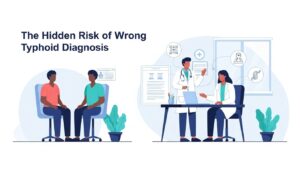From the Well-Life Hospital desk, an explanation of typhoid fever: essential information in Nigeria
Typhoid fever in Nigeria is still a major health risk, affecting millions of people annually, especially in areas with inadequate access to clean water, sanitation, and hygiene. The treatment of typhoid fever in Nigeria remains a critical concern, as timely and effective care can greatly improve outcomes. Important preventative measures also include the availability and application of the typhoid fever immunization in Nigeria. At Well-Life Hospital, we think that prevention and treatment begin with education. The following are the fundamentals of typhoid fever: how to identify it, how to treat it, and—most importantly—how to prevent it.
What Is Typhoid Fever
Salmonella enterica serotype Typhi is the bacterium that causes typhoid fever, a potentially fatal illness. The main ways that it spreads are through tainted food and water. After entering the body, the bacteria proliferate and enter the bloodstream, resulting in a variety of symptoms that, if untreated, may worsen.
The Reasons It Remains Common in Nigeria and Throughout Africa
In settings with insufficient access to potable water and adequate sanitation, typhoid thrives.
- In Nigeria, untreated or dangerous water sources are used by more than 86% of households.
- According to UNICEF (2023), just 13% of people have access to safely managed sanitation facilities.
- The spread is further facilitated by improper food handling and street food practices.
The World Health estimates that typhoid kills between 128,000 and 161,000 people a year anh Organization d affects between 11 and 20 million people worldwide. It is among the leading causes of fever in children and young people in Africa.
What Causes Typhoid Fever in Nigeria?
Typically, the germs are spread by:
- Consuming food or water tainted by an infected person’s excrement.
- Poor hand hygiene, particularly after using the restroom or before meals.
- Eating food from unclean street sellers.
- Even those who appear healthy might harbor and disseminate the bacteria without exhibiting any symptoms.
Typical Signs to Look Out for
Symptoms of typhoid usually show up 6–30 days after exposure. Among them are:
- High fever that doesn’t go away (up to 40°C or 104°F)
- Fatigue and weakness
- Abdominal ache and stomach pain
- Appetite loss
- Either constipation or diarrhea
- A headache
- Coughing that is dry
- Skin rash (sometimes)
Complications such as intestinal bleeding, perforation, and even death may arise if treatment is delayed.
Getting Diagnosed Early
A correct diagnosis is a priority at Well-Life Hospital. Appropriate testing is crucial since typhoid fever can mimic other tropical infections like malaria. Typical diagnostic techniques consist of:
- Widal Test (despite its drawbacks)
- Blood cultures are the most precise technique.
- Urine and stool tests
Drug resistance can be exacerbated by self-medication or using antibiotics to treat suspected typhoid without testing.
Options for Treatment
Antibiotics can be used to treat typhoid fever. Typical drugs include:
- Ciprofloxacin
- The antibiotic azithromycin
- Ceftriaxone (in extreme situations)
Important: Even if you feel better right away, always take the entire recommended dosage. Antibiotic resistance or relapse may result from therapy discontinuation.
Hospitalization and intravenous therapy may be necessary in severe situations. Our skilled physicians at Well-Life Hospital provide individualized treatment programs depending on your test results and symptoms.
Prevention Is More Effective (and Less Expensive) Than Cure
Simple, regular hygiene habits can prevent the majority of typhoid cases:
- Consume clean water.
Before drinking, bring the water to a boil.
If boiling is not an option, use chlorine tablets or water filters.
Roadside or sachet water should not be consumed unless it has been certified safe.
- Consume Food Properly
Steer clear of raw foods, particularly salads that have been washed in untreated water.
When it comes to street food, use caution and seek out sellers who practice good cleanliness.
Before eating, carefully wash fruits in clean water.
- Make Sanitation Better
Both before eating and after using the restroom, wash your hands with soap and clean water.
Promote toilet use instead of open defecation.
Get rid of rubbish the right way.
- Obtain a vaccination
Although it is not 100% effective, the typhoid vaccine lowers your risk considerably. It is advised for those who reside in or visit high-risk locations. Ask Well-Life Hospital about it.
Concluding Remarks: What We Tell Patients
It is possible to avoid contracting typhoid fever in Nigeria. However, it takes a team effort from healthcare professionals, families, communities, and individuals for treatment of typhoid fever in Nigeria. We at Well-Life Hospital are dedicated to promoting awareness, providing accurate diagnosis and care, and assisting you in taking preventative measures to maintain your health. The availability of the typhoid fever vaccine in Nigeria is also an important preventive step.
Don’t delay if you or a loved one exhibits symptoms. Go to the hospital that is closest to you. Early diagnosis can save lives.
Be careful. Keep yourself informed. Remain well.
Do you need assistance or more details visit our website https://welllifehospital.com/?






